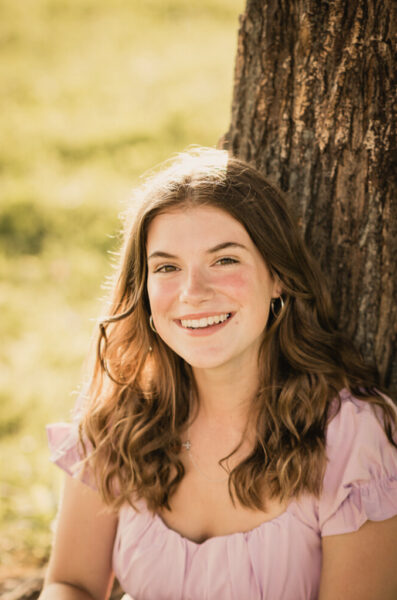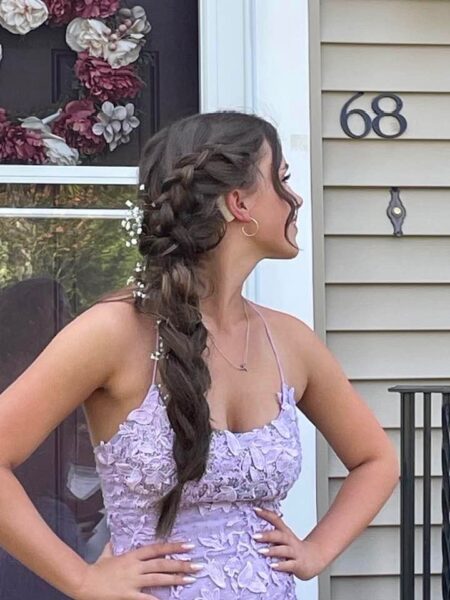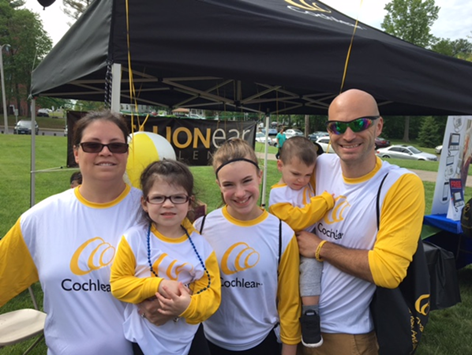Born with bilateral deafness, Trysta’s family identified that early intervention in their daughter’s hearing journey would offer the best opportunity for growth. With her cochlear implants Trysta transformed silence into sound, even inspiring her on a career-goal to become an audiologist. Read her story below:
“Do you hear that? Total silence. Nothing but quiet. No birds chirping. No car engines roaring. ‘Click,’ like a light switch turning on, the cochlear implant allows a deaf person who is living in a world of total silence to be able to hear.
Cochlear implants are electronic devices that help people hear when they have hearing loss or deafness. The cochlear implant is an electronic medical device that replaces the function of hair cells. Unlike hearing aids, which make the sound louder, cochlear implants do the work for the damaged parts of the inner ear to provide sound signals to the brain.”
 September 2005
September 2005
Trysta is born profoundly deaf in both ears
Mid-late 2006
Trysta obtains a cochlear implant surgery 6 months apart on both ears
“In September 2005, I was born deaf. My cochlear implants became life-changing devices for me. Both of my cochlear implants were surgically installed by the time I was 1 ½ years old1. Though it’s been a long journey, my cochlear implants have given me the ability to hear like any other normal-hearing person and they’ll always be a huge part of my life that has shaped me to become the person I am today.”
2007-2009
Early Intervention works with Trysta on speech to catch her up from the year she lost without hearing
2009
Trysta is provided with an individualized education plan (IEP)that was created when she entered school; with a ‘vision statement’ being: ‘Our vision for Trysta is for her to be a typical girl in which she is academically and socially on par or even advanced with the average, normal hearing child. We realize that as Trysta’s classmates and friends mature, they will be curious and question her disability. We want Trysta to have great self-esteem so that she can proudly and confidently explain her hearing loss without feeling different or less of a person. We do not want Trysta’s disability to hinder her academic and social growth.’
 Overcoming hardships along my hearing journey
Overcoming hardships along my hearing journey
“Throughout my life, I have faced the challenges of hearing loss and learning that it does not define me as a person. I took speech therapy when I was young and this allowed me to work on my hardships with some words, that I had trouble speaking. That hardship now allows me to have conversations where people can’t recognize I am deaf unless I bring awareness to it.
In my middle school years, I went through some challenges of being called ‘deaf and dumb’ because of my cochlear implant. For a long time, I was affected by these comments and began to believe it was true. I continued to work hard in school to not only prove to myself but to others that I was smarter than people thought. I became a National Honor Society student.
My hearing journey has given me the chance to participate in many fundraisers and several media outlets to raise awareness of hearing loss within the hearing community. Through these events, it became clear to me what I wanted to do with my life. I hope to help people with hearing loss, as I have been helped all my life.
A future built from the past
In college, I hope to study to become an audiologist where I will learn to work in a medical setting with people of all ages and backgrounds. I would love to work as an audiologist and help patients decide what is best for them when it comes to hearing.
Audiology is an important part of my life, as it is part of one of the many reasons I can hear. It is my passion to help people who also need help. I always enjoyed going to the audiologist because I was always given the confidence that I needed to be able to accomplish something I did not think I would be able to do. My audiologist has told me that I am the prime example that someone would want to receive cochlear implants as early in life as possible.
I would be forever grateful to take the amazing experiences I have received from my ability to hear and help people in need from the doctor’s side; from someone who has experienced it.
With my cochlear implants, I have been allowed to expand my love of baseball and sports by hearing the crack of the bat or the roar of the crowd after a home run is scored. I have been able to hear the other people around me laugh. I have been able to listen to music2 and allow myself to become a dancer and cheerleader. I heard and reacted to the gun during my track race.
My life has been forever improved due to my cochlear implants, and I am forever thankful for everything I have been given and look forward to the opportunity to share my passions.”
 If your child was born with hearing loss, or diagnosed as deaf, cochlear implants may be a solution to help with early intervention. Learn about your option today!
If your child was born with hearing loss, or diagnosed as deaf, cochlear implants may be a solution to help with early intervention. Learn about your option today!
- In the United States, the Cochlear Nucleus 24 cochlear implant system is intended for use in children 9 months to 24 months of age who have bilateral profound sensorineural hearing loss and demonstrate limited benefit from appropriate bilateral hearing aids. Children 2 years of age or older may demonstrate severe to profound hearing loss bilaterally. In Canada, the Cochlear Nucleus Implant System (CI500 and CI600 Series) is intended for use in children 9 months to 24 months of age who have bilateral profound sensorineural hearing loss and demonstrate limited benefit from appropriate bilateral hearing aids. Children two years of age or older may demonstrate severe to profound hearing loss bilaterally.
- For a full list of smartphone and app compatible devices, visit: www.cochlear.com/compatibility.